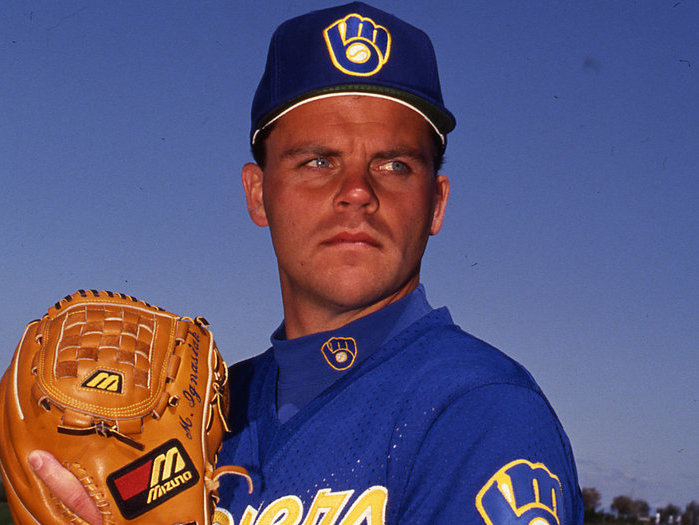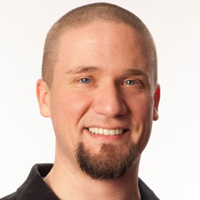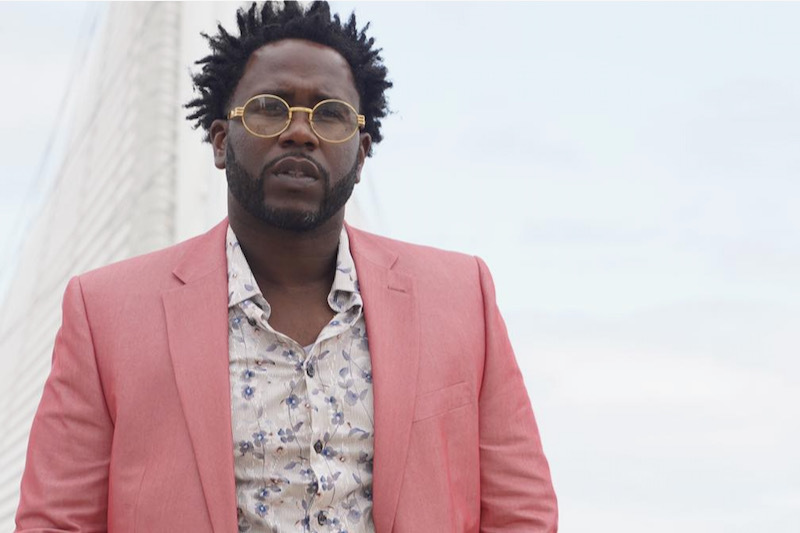Mike Ignasiak's career with the Milwaukee Brewers was cut short due to injury – he appeared in just 79 games over four years –- but the former reliever has found a new competitive outlet on the golf course. He's also a successful businessman in his native Michigan.
In this edition of Milwaukee Talks, Ignasiak speaks about golf, managing your money as an "average" major leaguer and the pleasant surprise he received upon his return to Milwaukee.
OnMilwaukee.com: You got the sectional qualifying stage for the U.S. Open in June – one step away from our national championship – where did it go wrong for you?
Mike Ignasiak: I think I was one or two under par after 28 holes and I just had one bad hole – took an eight on it – and the next hole was a double bogey and the next hole was another bogey and that was it. That was it. I was happy with the way I played. I didn’t putt very well. The experience was fantastic. I played with David Frost and a young kid from Alabama named Justin Thomas (the reigning NCAA Player of the Year), a really good player.
This was my second time (in sectional qualifying). The first time I had a chance to play with (major champion and Ryder Cup captain) Davis Love and Robert Gamez. I was a little over my skis on that one. Just like pitching in the big leagues in little league. It was fun though. I couldn’t have had a better pairing than what I had (with Frost and Thomas). I had a lot of fun.
OMC: Will you keep trying to play your way into an U.S. Open?
MI: I’ll keep giving it a go. I’ve probably got four more years until the senior circuit, but those guys are so good. That’s like a college player in baseball saying that he wants to be in the big leagues. I have to play my best every day to compete with those guys. Those guys, they know how to do stuff, they know where to hit it. They have much better equipment than we have. It’s not the same game. That’s what they do. It’s what they do every day. I don’t do it every day. I work for a living and I enjoy playing golf when I have time.
It’s a vacation for me. I know one thing – I have to play my absolute best to have a chance and then I’m playing with guys that I’ve looked up to all my life. It’s pretty cool. I don’t know how they feel about it. But I played with that David Frost guy from South African and he was just talking the whole time, cracking jokes. I thanked him afterwards. I said you made today very special. That was a lot of fun.
OMC: You’re a stereotype – a pitcher who’s a good golfer!
MI: You have a little off time when you pitch a little bit. You always gravitate towards it. I just liked the competition. It’s just something that I kind of grew up doing with my dad. Once baseball was over with I had to do something else. I took two years off because I hurt my back when I left the game, so I got that in shape.
And I wasn't going to run anymore, that’s for sure, with my knees and back. So, golf was right next door and I just liked trying to get better. I could hit the ball real far and I could hit my irons real well. It’s the short game that gets me. I just don’t work at it.
OMC: How competitive are you on the amateur level?
MI: Michigan has a very well-run amateur program. They’re rated pretty high across the country. The golf association of Michigan has three or four big tournaments a year for all the top amateurs in the state. The USGA has three big tournaments – the U.S. Amateur, the U.S. Public Links and the Mid-Am. I try for those every year.
I got lucky to play at Erin Hills (in 2011) at the U.S. Amateur, so that was a lot of fun. I’ve played in 10 or 11 USGA events since I started playing golf. It’s getting a little easier, but it’s getting tougher.
OMC: You were done playing at the ripe old age of 29 – what was your "something else?"
MI: The first year I got out of ball was ’96 and I bought a Dairy Queen in ’97 and I’ve been working every day since. I kind of grew up in the business as a kid. My parents had a Dairy Queen in the ‘50s, ‘60s and ‘70s and I told myself I would never own one. Two weeks I got out of ball an opportunity came across my desk to get into the business so me and my wife decided what the heck. Sixteen years later and we’re still doing it. It lets me play the golf a little bit, get a little time off in the winter.
I do miss the baseball, though. I do miss doing down and seeing the guys. I miss that the most. To tell you the truth, I don’t watch baseball anymore – until it’s the playoffs just because I’m so busy. Occasionally I’ll watch the playoffs and stuff like that, especially if the Tigers and the Brewers are in it. People will ask me "What’s that guy doing with the Tigers?" I say I don’t know who these guys are anymore – I don’t follow it enough!
OMC: Speaking of the playoffs then, did you get invested in the Brewers again in 2008 and 2011?
MI: Oh yeah. Definitely. Those were fun teams to watch. They’re still a good team to watch. When they were making that run there, it was fun to watch for Milwaukee. Milwaukee is a great town to play in; the fans are so nice to you. They were great. The media was always nice to you. Whatever you said to the media, it was in the paper the exact same way you said it. The town was just a Midwest town. It was a great place to live. A great place to live. You go to New York and you tell ‘em it’s raining outside and the next day they’ll say it’s sunny – it’s the complete opposite.
OMC: Where did you live when you played here?
MI: I lived in Brookfield most of the time that I was there.
OMC: Any favorite haunts?
MI: I don’t know if it’s still there – Saz’s – oh man, that place … we used to eat there all the time. I loved their ribs. Just a great place. I tell everybody that, because I know a lot of guys that are traveling salesmen, I say if you’re ever in Milwaukee stop and get some ribs at this place and they’d come back and sure enough they loved it. That was a great place.
I hadn’t been down to Milwaukee since ’97 and then we went there in 2011 when we were at the U.S. Amateur and the way they did the (RiverWalk) and Downtown, just, wow. What a difference. It was beautiful down there. They had a lot of people right there on the water using all that stuff. They have the aquarium (at Discovery World) down there and stuff like that. That was beautiful.
OMC: If you were playing here in 2013 you might be living a little closer to the ballpark, then?
MI: I think I’d be living Downtown if I was to do it again. I had a real nice time down in Milwaukee when were there. I’d probably have an apartment or a condo down near the water. It was nice.
OMC: Your job has taken you away from the game, but it’s not rare for players to really detach themselves from the game they played. Was it nice to let it go?
MI: Well, I was disappointed because my body didn’t allow me to do it anymore. I hurt my back probably two or three times and it was just frustrating because I never had an arm problem but after the first time I hurt my back, no matter what I did or what kind of rehab, it would always come back. I was always disappointed in that.
Sure, I would’ve loved to pitch another six or 10 years. But I’ve got no regrets. I enjoyed my time with what I did. Everyone told me I was never going to make it anyways, but I did. So, I gave it 100 percent and no one’s going to play forever, that’s for sure. I enjoyed it. It allowed me to see the country. I met a lot of good people I still keep in contact with. A lot of good friends all across the country. It was definitely worth it. Definitely.
OMC: A quick aside – any chance you have a recent photo that you could send along for this story?
MI: I have no pictures of myself playing golf – use a young baseball picture of me! Use one about 1990, 1991 with no gray hair.
OMC: I’m sure the team could help us out there – do you still get recognized as a former Brewer?
MI: Oh yeah. I still get fan mail. I work at the store and people stop by the store and drop off stuff and I sign it for ‘em. I kind of help out around this area a little bit with Little Leaguers and kids that I know I’ll help them with their pitching or hitting, just to say hi and help them out a little bit.
OMC: Are you getting asked for lessons on the driving range though?
MI: No, no, no – I try to be really quiet around the golf course.
OMC: You mentioned being able to play with some of the golfers you look up to – it’s kind of a role reversal for a pro athlete. Did you ask them to sign a ball or extra scorecard to keep?
MI: No, I was never one like that. I remember when I was playing guys would send hats and balls over to Nolan Ryan, get that stuff signed, or Frank Thomas. I never was really into that stuff. Now that I think about it, I probably should have! I just didn’t care for that stuff.
OMC: Growing up in the Dairy Queen business – how important was that for you to have that background considering your career ended so abruptly?
MI: I had two kids, another one on the way, so what are you going to do here? You had to make a decision. But, growing up in that business … we had 12 kids in my family and my mom and dad said you either work or you play sports.
So, we’re not rocket scientists but we’re not idiots either. So what are you going to do? Work, or play? So, everybody in my family played some kind of sport. My older brother (Gary) pitched for the Tigers in the late ‘60s and early ‘70s and we all played baseball. Everybody in our family played baseball. We were playing baseball around the clock back then.
Even when I playing, I saw guys living way over their means. They may be making two, three million dollars a year but I knew in the back of my mind it’s not going to last. So I was never a guy that had $10 in my pocket and buy something that was worth $20, you know? We kind of grew up with that mentality.
My family, growing up, not me particularly, my older brothers and sisters, they had nothing when my mom and dad started. So they knew what nothing meant. So we all had that mentality. If you had $5, you couldn’t spend $10. So we always counted our money, put it away. All 12 of the kids work hard, and they don’t live over their means – which you saw every day in the big leagues when I was there.
Guys go out and buy two or three motorcycles, brand new cars, and I’m going man, if they get hurt, they’re going to have nothing. And sure enough, half the guys did. Look at the bankruptcy average for people who get out of sports. It’s amazing. They think it’s going to last forever. I think I was just wise enough and my parents taught us enough that hey, you never know what’s going to happen tomorrow.
Jim Owczarski is an award-winning sports journalist and comes to Milwaukee by way of the Chicago Sun-Times Media Network.
A three-year Wisconsin resident who has considered Milwaukee a second home for the better part of seven years, he brings to the market experience covering nearly all major and college sports.
To this point in his career, he has been awarded six national Associated Press Sports Editors awards for investigative reporting, feature writing, breaking news and projects. He is also a four-time nominee for the prestigious Peter J. Lisagor Awards for Exemplary Journalism, presented by the Chicago Headline Club, and is a two-time winner for Best Sports Story. He has also won numerous other Illinois Press Association, Illinois Associated Press and Northern Illinois Newspaper Association awards.
Jim's career started in earnest as a North Central College (Naperville, Ill.) senior in 2002 when he received a Richter Fellowship to cover the Chicago White Sox in spring training. He was hired by the Naperville Sun in 2003 and moved on to the Aurora Beacon News in 2007 before joining OnMilwaukee.com.
In that time, he has covered the events, news and personalities that make up the PGA Tour, LPGA Tour, Major League Baseball, the National Football League, the National Hockey League, NCAA football, baseball and men's and women's basketball as well as boxing, mixed martial arts and various U.S. Olympic teams.
Golf aficionados who venture into Illinois have also read Jim in GOLF Chicago Magazine as well as the Chicago District Golfer and Illinois Golfer magazines.




.jpg)


